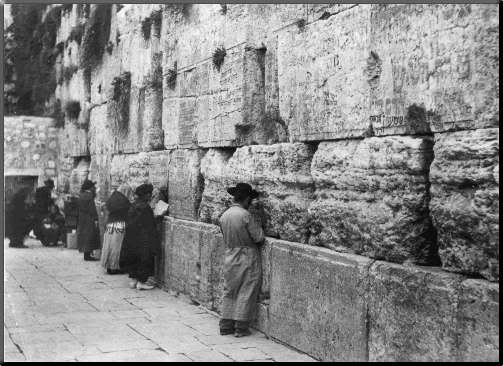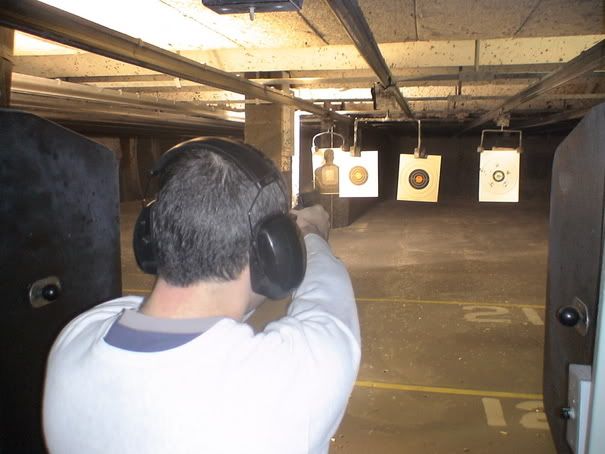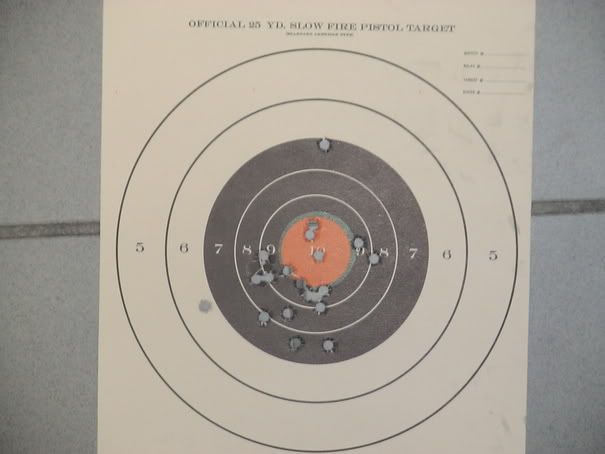
Ode to Ikea - Home of New Beginnings
Some time last year, the founder of Ikea, a Swede named Ingvar Kamprad, overtook Bill Gates as the richest man in world. Who would have thunk that the maker of put-it-together-yourself particleboard furniture would build an empire of almost 200 stores in 30 countries and end up the richest man in the world?
What is it about Ikea that makes it so popular? A recent trip by Bella's Mom and I to our neighborhood Ikea could be instructive.
First of all, there's that escalator ride up to the showroom. Reminisicent of the lines to Space Mountain at Disneyland, its as if you have left your normal life behind, and are ascending to a new level. The showroom. The furniture of course is nicely laid out, looking stylish and now. There's the Ektorp and the Lyckeby and the Malm and the Hensvik (the names make me laugh). Sure there's some nice stuff, but that's not what it is.
There's the restaurant with the full breakfast for $0.99, or the Swedish meatballs and the lingonberries (what are those?), or maybe the Swedish applecake with the vanilla sauce. Some of it sounds good, but then again, Sweden isn't exactly known to be a culinary powerhouse.
You continue through the serpentine showroom, careful to follow the big blue arrows on the floor, brightly lit from above. You enter the "marketplace," with the shiny utensils, the colorful textiles, the hip lighting fixtures, and the pop art, ready for framing. Nice, but the richest man in the world?
As you look at the people around you, it dawns on you. People come to Ikea when they're at a new beginning. There's the two obviously college roommates you see looking at the $99 table with the four chairs. There's the young newlywed couple trying out the different couches. The pregnant woman is looking at the cribs and changing tables while clutching her back. The woman with the clipboard is watching the man with gloves load up twenty single bookshelves - are they for a new library, a new store? The guy with the torn T-shirt is checking out the CD racks, the woman with the baby in the cart is choosing new curtains for the nursery, and on and on.
This wasn't meant to be an ad for Ikea (though I will of course accept any offers of compensation), its just a place I used to go to when I was in college, its where we bought our bookshelves when we were newlyweds, and where we just bought a little nightstand to put by the rocking chair in our son's bedroom. Ingvar Kamprad hit on something by putting together a clean, well-lit store with hip home furnishings at reasonable prices. Sure they may be made of thick cardboard held together by wooden divets and the customer's own elbow grease, but they look and feel new, have exotic names and fit the customer's needs to a tee.
As long as people continue to have new beginnings, Ikea will continue to succeed. People come there to start something new, and they bring their positive energy with them. Ingvar Kamprad just found a way to channel that energy into his pocketbook, which is now apparently bulging at the seams. Even though it may not be the best quality furniture, and it isn't necessarily built to last, it still gets the job done, and most importantly, it gets those new beginnings off to a good start. Here's to you Mr. Kamprad, I raise a Svalka in your honor.
My Memory of Challenger - January 28, 1986
There are historical events that occur where people look back and say that they always will remember what they were doing at the time they heard of the event. I think of President Kennedy's assassination in those terms, and perhaps the death of Elvis Presley or maybe John Lennon's murder. This Saturday will be the twentieth anniversary of the space shuttle Challenger disaster.
For me, the Challenger disaster was the first event in my life that affected me in that President Kennedy kind of way. I'm not sure if others share this same feeling, but it affected me powerfully. As the son of an electronic engineer, with an uncle who has worked in aerospace, and also growing up in Southern California, the aerospace industry has been an omnipresent and important part of my life.
One of my father's friends was an engineer at Rockwell International, and was a part of the team that designed the space shuttle series. For my tenth birthday, he brought me a collection of artist's renditions of the space shuttle in action, way before its maiden flight. I proudly decorated my room with the prints, and they were fixtures on my wall for many years.
In high school, a group of friends and I drove out to Edwards Air Force Base one chilly morning to watch the space shuttle Discovery land after one of its early missions. We parked on the dry lake bed with the various other spectators and had a grand old time. We heard Discovery's two sonic booms, and then watched it glide to a perfect landing. A truly awesome sight.
The morning of January 28th, 1986 I was a freshman in college at UCLA. That first year of college, I lived at home with my parents. For the early space shuttle missions, a launch was still considered a big deal, and they were televised live. I got up that morning and was looking forward to watching the launch of Challenger. The launch had been postponed several times for various reasons, and I wondered if it would go off as planned. There was much excitement about the astronaut Christa McAuliffe, who was to be the first teacher sent to space. Besides McAuliffe, the Challenger crew consisted of mission commander Francis R. Scobee; pilot Michael J. Smith; mission specialists Ronald E. McNair, Ellison S. Onizuka, and Judith A. Resnik; and payload specialist Gregory B. Jarvis. Christa was also listed as a payload specialist.
As the launch occurred, and the explosion followed, I remember sitting on my parents' bed, alone at home, watching with disbelief. Tears streamed down my face as I watched Challenger explode and break up. I watched for a while longer, and with a heavy heart, left for class.
When I arrived at the biology lab section that morning, I was struck by how little it seemed to matter to my classmates. I walked in and everyone seemed to be behaving normally. There was no sense that a tragedy had occurred, and I remember feeling confused about it. For some reason, I felt like no one really cared about it, at least not as much as I did. I turned to my lab partner and asked if he knew that Challenger had blown up and he said that he did, but didn't say anything else about it. The lab instructor got up, gave us the morning's assignment, and it was business as usual.
Of course later I watched all the news coverage and heard President Reagan's speeches about the heroic astronauts. I mourned their deaths too, and mourned the first casualty of the shuttle program. Years later when Columbia broke up on its return to earth it upset me as well, but it wasn't the same as that day when Challenger exploded.
In my life, there have only been a few events that have impacted me in the same way as the Challenger disaster. The day when Saddam Hussein lobbed the first Scuds at Israel is one, and of course, Sept 11th will also stick with me forever. The latter two cases are days when I felt a sense of danger not necessarily for myself, but for people and places that I loved so much. Many people were upset and worried by the Scuds and the first Gulf War, and 9-11 of course will go down in history as a day that changed the world forever. On January 28th, 1986 I didn't feel like anyone was in danger (other than the astronauts of course) and I don't think it changed the world. But I definitely lost some of my childhood hopes and innocence that day, and I think that is why it affected me so powerfully. I will always remember that day.
America, Israel, and Hamas
A thought-provoking essay at Daily Kos with perspective on allowing Hamas to participate in the upcoming Palestinian election process. He draws a parallel to the Nineties, when Fatah and the PLO claimed to reject terrorism and joined the political process:
And when I hear the voices which call for us to reject Hamas, and tell us
that there is no hope that Hamas can ever come to peace with Israel, I remember
how the voices then told us the same about Fatah... [If] we dare to give
Hamas the chance we gave to Fatah, that we can all learn the limits of violence
and come to the room to talk and shake hands. Perhaps they will not accept
us, and will not accept peace. We know only too well how to deal with
that, and if we must, we shall again. But we can only have hope if we dare
to take the chance.
I am not ready to accept his premise - namely that allowing Hamas to participate in the political process now would be a positive step towards peace. Hamas's founding charter calls for (and continues to call for) the destruction of Israel and wants to impose an Islamic state on all Palestinian territory. All that needs to change. Even Fatah has not come around in the way one would have liked, as of late they seem to have regressed to their old terrorist ways. Corruption is rampant in Fatah, and this has actually been Hamas' biggest selling point - that they are reliable and relatively free of corruption. But they still have much blood on their hands. But the first step is thinking about change which is what Jay Elias has done, as naive as it currently seems. Unfortunately, the only alternative is more pain and suffering on both sides.
In a related story, "New-look Hamas spends £100k on an image makeover." I kid you not .
Lame Post
Our six month old son got his first cold. We haven't slept more than two hours in a row in a week. Now I have a cold too. I really can't think very well. Please discuss the following and tell me what it means:
Oh, I could hide 'neath the wings
Of the bluebird as she sings.
The six o'clock alarm would never ring.
But it rings and I rise,
Wipe the sleep out of my eyes.
My shavin' razor's cold and it stings.
Cheer up, Sleepy Jean.
Oh, what can it mean.
To a daydream believer
And a homecoming queen.
You once thought of me
As a white knight on a steed.
Now you know how happy I can be.
Oh, and our good times start and end
Without dollar one to spend.
But how much, baby, do we really need.
Cheer up, Sleepy Jean.
Oh, what can it mean.
To a daydream believer
And a homecoming queen.
Cheer up, Sleepy Jean.
Oh, what can it mean.
To a daydream believer
And a homecoming queen.
[Repeat and fade]
Thank you very much. We hope to resume regularly scheduled programming soon.
Bush Blew It, Again
Since Medicare Part D kicked in, I have noticed a marked increase in my elderly patients not being able to get their medications, or having to pay the full out of pocket expense. Apparently there has been concern from both sides of the aisle in Congress as well:
The concern was bipartisan. Senator Judd Gregg, Republican of New Hampshire, said many people had been "turned away at their pharmacies or told that they must purchase the drugs up front and seek reimbursement later."
"These are very vulnerable people who do not have the means to pay for their prescriptions and who cannot go without their medications," Mr. Gregg said.
Particularly troubling have been the poorer patients who previously obtained their meds through Medicaid, and now are forced to come up with more funds to pay their copays (if they can get their medications at all).
It's nice to see bipartisan criticism of the Bush Administration for a change, and governors from both parties (including our own Govinator) have been signing emergency legislation into laws to help bridge the gap until Medicare and its contracted insurers gets their act together:
The new federal program is too complicated for many people to understand, and the implementation of the new program by the federal government has been awful," said Gov. Tim Pawlenty of Minnesota, a Republican.
And:
Gov. Mike Huckabee of Arkansas, a Republican who is chairman of the National Governors Association, declared a public health emergency.
Like with his initial response to Katrina, Bush has been pointing fingers at everyone but his own executive branch, which is supposed to execute the laws that he signs. Eventually, someone is undoubtedly going to be the scapegoat and have to resign, but only after being told they have been doing a "heck of a job." Great way to get that approval rating up!
What Should I Have Done?
When I was asked to see the 78 year-old Mrs. Goldberg (not her real name) the other day, I was forewarned that she had an "interesting" or "challenging" personality. Indeed, when I walked into her hospital room she was busy getting dressed and preparing to leave the hospital against medical advice. Her husband and daughter stood by speechless.
I introduced myself, told her I was a cardiologist and explained to her that I was there to see her because her primary care doctor thought she had suffered a heart attack. She replied that she had heard that too, and that they were wrong and that all she had was the flu.
I proceeded to ask her a few questions about her medical history. She told me that she had been experiencing trouble breathing while walking to syngagogue for some time now. After a few more questions it quickly became clear that we in fact attended the same synagogue (though she didn't look familiar to me)! She then sat down and agreed to stay in the hospital so we could finish working her up.
Her condition improved rapidly, and this morning I arrived on her floor intending to discharge her. On my arrival, the nurse taking care of her informed me that Mrs. Goldberg was not eating, and that she was saying she was on a hunger strike. I went to her room and asked her about it.
She told me: "I have not eaten in fourteen and a half hours and have now been waiting for breakfast for three hours and it has not arrived. My last meal was the ice cold turkey they served me for dinner yesterday."
I nodded my head.
"I am on a hunger strike to protest the terrible food at this hospital. I am supposed to be on a low salt diet, and not only was the turkey ice cold, but I KNOW there was salt in it!"
I proceeded to examine her, and found her to be physically fit for discharge and told her so. She thanked me and told me she would see me in my office later this week.
As I sat ordering her discharge, the nurse emerged from her room and said: "She wants to go down to the hospital cafeteria to eat breakfast, and she's on a cardiac diet you know." I told the nurse I was discharging the patient, and that once discharged she could do whatever she pleased.
Next thing I know, Mrs. Goldberg, in her hospital gown with the rear open, is standing in front of me.
"Doctor Wanderer," she says, "I have not eaten in 14 and a half hours. The nurse has offered to call the hospital kitchen for my breakfast, but I told her not to because I am protesting this hospital's food. It is not good enough to give a DOG! Is it OK if I go down to the cafeteria for some breakfast?".
"Mrs. Goldberg," I say, "I am discharging you now and you can then go home and eat whatever your heart desires."
"Thank you, Doctor," she replies. "I need to ask you a favor. My husband took all my belongings home and I don't have my wallet. Could I borrow ten dollars so I can go to the cafeteria? I promise I'll pay you back in shul..." (shul=syngagogue).
Wow, I thought to myself. I have never been asked for a favor like that by a patient (unless you count the drug addicts who used to ask me for "cabfare" when I was a medical student in the Bronx). To be honest, it made me feel a little uncomfortable. The nurses stood around with huge smiles on their faces, giggling, and Mrs. Goldberg was waiting for an answer.
What should I have done?
Drano for Your Arteries
I'm going to wear my cardiologist hat for this post. The article linked refers to a treatment that could potentially revolutionize the care of heart disease if it proves to be effective. It could conceivably eliminate the need for anyone ever needing coronary artery bypass surgery or angioplasty, and prevent heart attacks just by taking a pill!
It is also a wonderful story about how a serendipitous observation by a smart physician in a small northern Italian town called Limone sul Garda could eventually result in millions of lives being saved.
This doctor saw a 49 year old man named Valerio Dagnoli who was sick with something non-cardiac and happened to order a cholesterol panel. "[He] found that the villager's HDL of 7 was dangerously low, well below the normal level of 40. His triglycerides, other blood fats linked to heart disease, were 319, more than twice the norm. Despite these ominous signs, his arteries were clear," and furthermore it turned out that he came from a family that never experienced any heart disease!
"Puzzled by the result, the doctor sent Dagnoli to a specialist, Cesare Sirtori, in Milan. The case so intrigued Sirtori that he screened all 1,100 residents of Limone sul Garda to see whether he could find others with similar blood profiles. He found 40 people, all of whom could be traced to common ancestors born in the late 1700s. Their HDL averaged less than 20, half of normal for men and women. " None of them had heart disease.
Researchers eventually found that the villagers had a mutation in HDL's biggest protein, apoA-1. They dubbed the mutant version apoA-1 Milano.
Subsequent testing in animals has shown that infusion of apoA-1 Milano can actually lead to shrinkage of the plaques that often can lead to blocked arteries and heart attacks. To date, no other treatment had ever been shown to do this effectively, and with a good safety profile.
Celebrations have ensued, particularly in the pharmaceutical industry, as they have rushed to jump on the bandwagon and get the drug tested and out on the market. A similar story exists for another mutation found in a small group of related individuals from the Japanese island of Honshu. This drug is also in the developmental stage.
What does this all mean? Well, for now nothing, so don't go out and load up on hamburgers, french fries and ice cream because the drugs aren't ready for prime time yet. But it is a great story (at least to a medical geek like me) and offers great hope for the future treatment of heart disease, the number one killer in this country. Stay tuned!
The Good Old Days
It seems that things were always better in the Good Old Days.
Riding down the elevator from my office this morning, an elderly gentleman is conversing with someone else on the elevator.
"The Fifties were the good old days, not today."
I interject:
"Not the good old days thing again, tomorrow you'll say that today was better than tomorrow because it will have become the good old days."
He replies: "No, today is wild and crazy. The good old days were in the 1950's."
To which I reply: "How can you say that? The 1950's were full of fear, the Red Menace, nuclear annihilation, Joseph McCarthy, etc."
"Son," he says, "I fought in the Korean War in the 1950's. I was seriously wounded and ended up at Walter Reed Medical Center outside Washington, D.C. Senator McCarthy came to visit me."
"Really." I said.
"Yes, he wanted me to sign an oath of loyalty."
"Interesting. So what did you do?"
"I told him to go f#%& himself."
And he walked off the elevator.
Aside from the enjoyment I derived from seeing an 80 year old using the f-word, it struck me as amazing that despite the fact that he went to war, despite the fact that he was wounded and despite the fact that the country was in a state of suspicion and fear, he still felt that those were the good old days. Why is that?
Why is it that we are never satisfied with the here and now? Things were always better before, and of course, they can only get better in the future. Or maybe they're not always going to get better in the future. To quote Jack Nicholson "What if this is as good as it gets?"
I can understand being optimistic about the future more than I can understand the notion that things were always better before. I think part of the way our mind works is to focus on the good stuff in our life, and suppress things that were bad. I've said before that our memory for events can be selective, but does that apply to emotions, feelings and our sense of well-being? Are the emotions and feelings actually more important? There are parts of my life I can look back on and say those were the good old days (year I spent at Hebrew University in Jerusalem), and other parts were the bad old days (11th Grade). I assign them as good or bad based not entirely on what happened to me, but based on the emotions I remember I had at the time. So maybe elderly elevator guy went to war and was wounded, but he was happy to do it, felt good about himself at the time, and that's why they were the good old days. Either way, I hope to live to an age where I can recount to a young whippersnapper that I once told someone like a United States Senator to go f#%& himself! The Good Old Days indeed!
Geraldo Was Right!
Well, sort of. As a follow up on an earlier post, it turns out the skull was not Mozart's, and even more surprising that the alleged remains of his grandmother and niece aren't even the remains of relatives.
But DNA analysis by researchers at the Institute for Forensic Medicine in
Innsbruck and the U.S. Armed Forces DNA Identification Laboratory in Rockville,
Maryland, proved inconclusive. The team found no link between the skull and the
exhumed remains, nor among the remains themselves...
...In a similar but unrelated project, scientists at the U.S. Department of Energy's Argonne National Laboratory reported last month that x-ray analysis of skull fragments from Ludwig van Beethoven showed that the German composer died of severe lead poisoning.
Glad to see our tax dollars hard at work unraveling these important mysteries...
Voila!
The dining room is finished. We think it looks great, much brighter and warmer than the Sangria color before. The Saffron paint is from Restoration Hardware and was really a pleasure to work with and clean up. Here is the finished product:
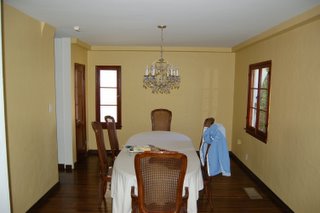
I must say that I had a hard time with the trim. I taped everything up really well, but still paint got in under the tape and I had to spend a couple hours last night getting it off the trim with a scraper. I have the aching back to prove it!
More Vacation Fun!
As promised, more details of my low-key vacation...
We moved into our house about a year and a half ago and had it painted. At the time we thought it would be cool if our dining room had the feel of a Parisian bistro, and therefore we had it painted a deep red color, called Sangria. It works really in Paris, but we decided it was too dark for our house, and have decided to change it to a lighter, brighter, Dijon Mustard like color called Saffron. Here's what it looked like when it was Sangria before I started the prep work:

I actually enjoy painting, provided its in limited doses. The most important three words in painting are prep, prep, and prep, and I've also learned to use the best brushes, etc. So far I've prepped the room, and just finished a first coat of primer:

I'll post the final results, hopefully by Sunday!
Aside from painting, I also have taken the time to go to the dentist since I haven't had the time to go as often as I'd like to. Here is a photo of my teeth from the beginning of the week, before I went to the dentist. He said I had no cavities, but had to do a better job flossing. As you can see in the photo, I have not shaven since being on vacation:

After a trim of the beard, the teeth cleaning and a treatment with the Zoom! whitening system, the results are much better:

Note that your results with the Zoom! system may vary...
Whaddaya think? Nothing like a good low-key vacation to catch up on things, no?
Mozart's Skull
This month marks the 250th anniversary of Wolfgang Amadeus Mozart's birth. As a part of the festivities the results of DNA testing on a skull believed to be his are to be released this Sunday!
Those of us who remember the movie (which is generally accurate historically, with drama, of course) will recall that he was buried in a pauper's grave after what was believed to be a bout of rheumatic fever or tuberculosis. More recent evidence suggests that rheumatic fever may not have been involved. From the linked article:
In 1991, a French scholar who examined it made the startling - though
unconfirmed - conclusion that Mozart may have died of complications of a head
injury...[based on] a fracture he found on the skull's left temple. Mozart, he
theorized, may have sustained it in a fall, and that would help explain the
severe headaches the composer was said to have suffered more than a year before his death.
Hmmm, interesting. Maybe they could make an alternative ending to the movie now? Like some bar room brawl where he suffers head trauma or a boxing match with Salieri?
Apparently "genetic material from scrapings from the skull was analyzed and compared to DNA samples gathered in 2004 from the thigh bones of Mozart's maternal grandmother and a niece." I guess they know for fact the identity of these relatives and therefore will be able to have a high statistical likelihood that the skull belongs to old Wolfie. Stay tuned.
Early reports coming in had Geraldo Rivera giving 2:1 odds that the skull actually belongs to Al Capone...
Starting Off My Vacation With A Bang
Being the low guy on the totem pole in my medical group, I didn't get to take my winter vacation until this week. I'm planning on being pretty low key - spending time with my wife and baby son, going to the dentist, getting new glasses, taking the car in for service, painting a room in the house, getting some new bedroom furniture, etc.
A couple of months back, my buddy Doctor Bean had invited me to join him for some target practice at the local firing range. We had talked about gun ownership in the aftermath of the Hurricane Katina government debacle and I had expressed my fears that we would not be able to rely on the government for security in the aftermath of a major natural disaster (like the expected Big One -earthquake- here in Los Angeles). Always eager to recruit new members to the NRA, Bean was kind enough to suggest that we go shootin' so I could try the cold steel feel of a Glock for myself.
After a twenty minute session on basic handgun safety in the Bean dining room, we proceeded to head down to the firing range. Of course we called ahead to confirm that they would be open on "New Year's Day Observed." We got there, signed the necessary release forms stating that we didn't hold the range liable if we got shot, and bought two hundred rounds of 9 mm ammo to blast away. Here is a picture of me in shootin' pose:
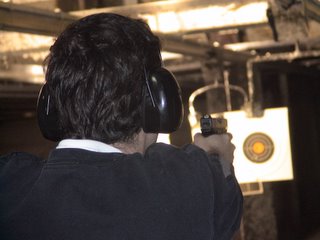
Bean also shot away, and I must admit he was a much better shot than I (experience, experience)...
As he was shootin' away, I began to notice something strange happening to his neck. An odd transformation unfolded before my very eyes. At first there was just a hint of a flush. Then it began to coalesce, and a pink hue developed. After he fired a few more rounds, it finally happened. Doctor Bean had transformed into a redneck before my very eyes! I couldn't believe it (and you probably don't either) but the act of shootin' a gun at a firing range transformed that mild-mannered, easy-going internist into a living, breathing redneck! See for yourself:

Ha! Bottom line - it was a lot of fun. Not quite sure if I will get my own weapon, but it was a great way to start my low-key vacation off with a bang. I'll try to post some more of the goings-on as they come up!





